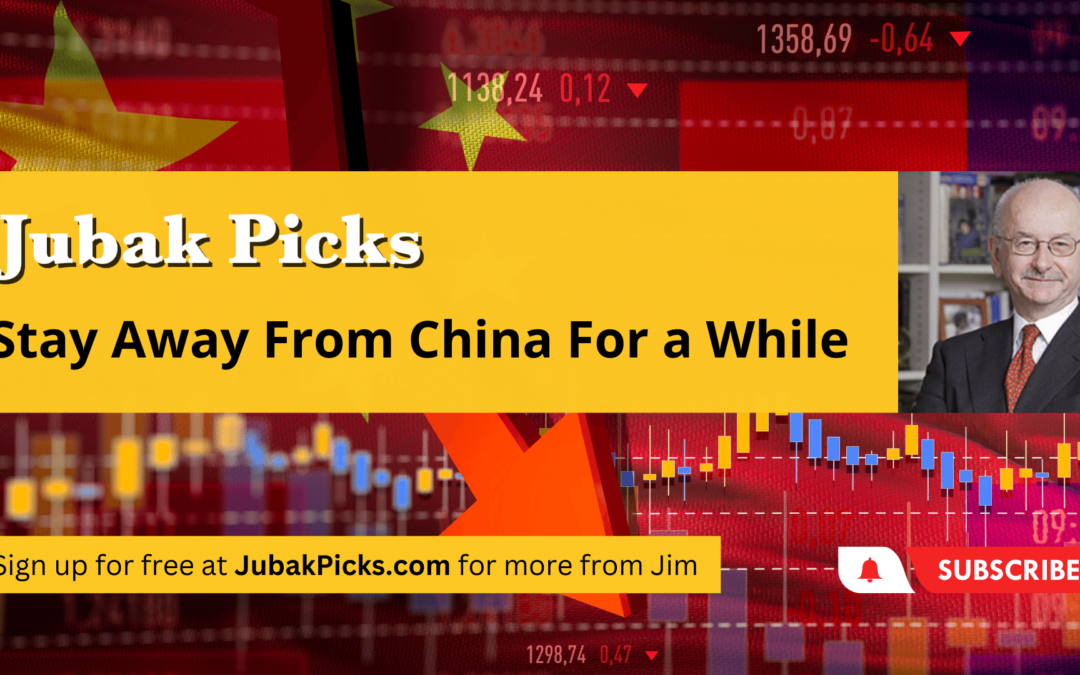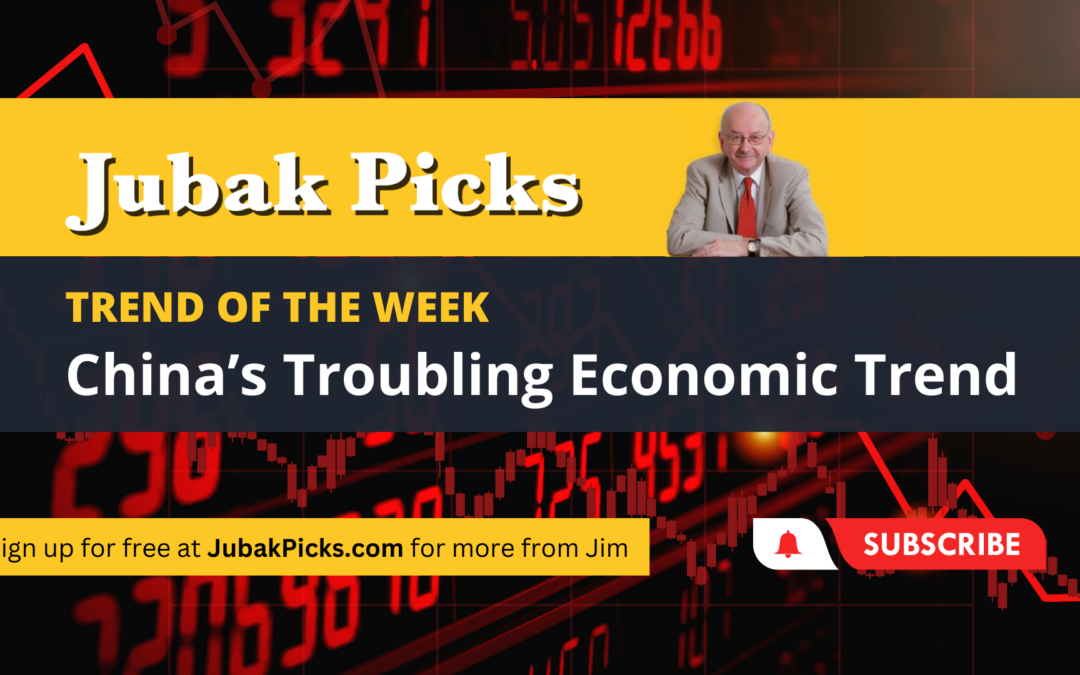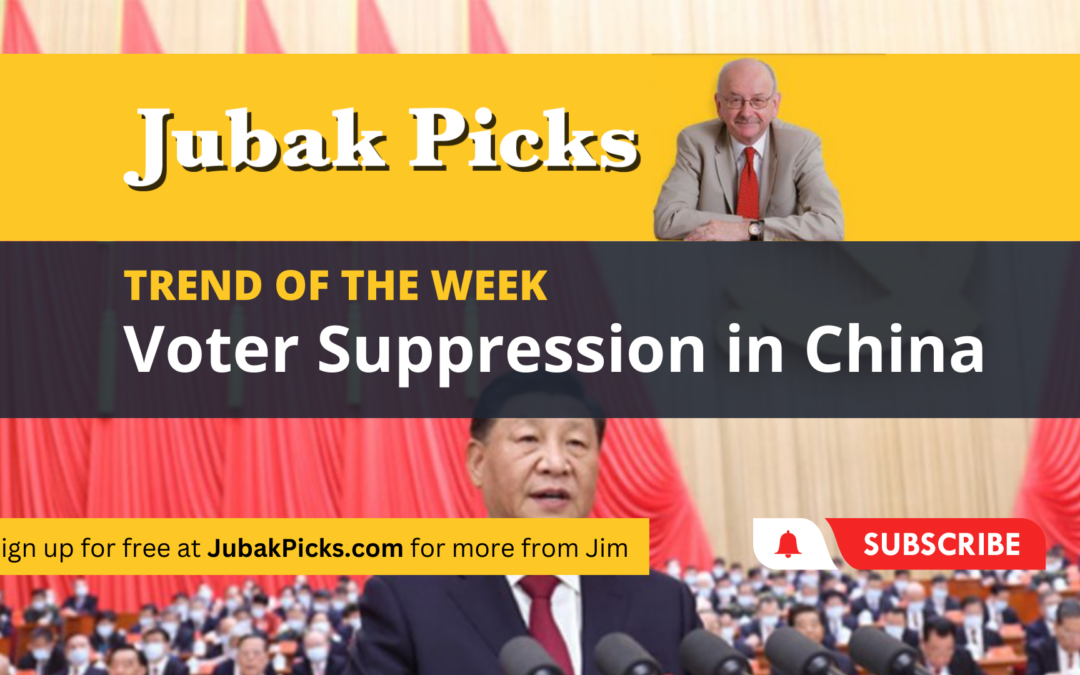
October 18, 2024 | Daily JAM, Morning Briefing |
Minutes after the release of government data that showed the economy grew at just a 4.6% year over year rate in the third quarter (the official target is 5% growth), the People’s Bank of China announced new measures to support the country’s financial markets. People’s Bank Governor Pan Gongsheng flagged the real estate and stock markets as key challenges in the economy that require targeted policy support. the 4.6% growth rate is the slowest pace in six quarters.

September 10, 2024 | Daily JAM, Morning Briefing |
With Chinese stocks looking at an unprecedented fourth consecutive losing year, even some of Wall Street’s most conspicuous China bulls are throwing in the towel.
Over the past two weeks, long-standing China bulls UBS Global Wealth Management, Nomura Holdings, and JPMorgan Chase have all downgraded the country’s stocks. And there’s a growing consensus that China will fail to meet its economic growth target of around 5% this year. The money NOT flowing into China has made this a good year for stocks in India, Japan, and Taiwan.

March 16, 2024 | Daily JAM, Mid Term |
As James Earl Jones told Kevin Costner in Field of Dreams, “Build it and they will come.” Of course, if they don’t come on schedule, you’ll wind up sitting on a mountain of debt. Which is the reason that Melco Resorts and Entertainment finished 2023 with total debt of $8.1 billion. Which, in turn, is why the stock traded at just $7.20 a share on Friday, March 15. And why it’s down 18% for 2024 to date, as of the March 15 close, and down 40.36% for the last 12 months. But I also see the potential for a 60% gain to fair value in these shares.

February 8, 2024 | Daily JAM, EWY, Mid Term, Perfect Five-ETFs, Stock Alerts |
I try not to argue with cash flows. Especially when I’m making asset allocation decisions. And right now global cash is heading for India. A number of reasons. Portfolio managers looking for diversification need emerging markets exposure and India looks like the best bet. Going long India is, in effect going short China since much of the new India money is essentially old China money fleeing what looks like an economy set to struggle for a while. And there is an India fundamental story based on an economy headed for 7% growth. For all these reasons I’m added the Franklin FTSE India ETF (FLIN) to both my Perfect 5 ETF Portfolio as rep

January 29, 2024 | Daily JAM |
A Hong Kong court has ordered the liquidation of China Evergrande Group, the world’s most indebted property developer with more than $300 billion in liabilities. Thousands of unfinished but paid for apartments from the developer litter China.Of course, this being China, it’s unclear whether Chinese authorities will recognize the Hong Kong court’s ruling and allow international creditors to seize the company’s assets.

December 28, 2023 | Daily JAM, Jubak Picks, Mid Term, Morning Briefing, Special Reports, Top 50 Stocks, Volatility |
GREATER Growth Stock Pick #8: BYD (BYDDF). I know; I know. What’s a Chinese stock doing on this list? It’s here because BYD, not Tesla (TSLA) is the big growth story in electric vehicles and not just for this month–but for years. And because I can see two catalysts that are about to power this stock higher. Morningstar calculates that BYD is 20% undervalued right now. Because this is a China stock we’ll need to take a deep look at valuation later in this post. But first, the growth story.

August 24, 2023 | Daily JAM, Videos |
Today’s video is: Stay Away From China for a While. China is looking at a long-term downward trend in the price of Chinese stocks. The iShares MSCI China ETF is down 8.1% year to date. It was down nearly 23% in 2022 and around 22% in 2021. What’s causing this? China has a long-term demographic problem. You’ll see occasional spikes in stock prices whenever the government puts money into the economy, but those spikes disappear after it becomes evident that putting more money into the system isn’t enough to fix it. In the long term, China is going through some extreme demographic changes. Last year, China’s population fell for the first time since 1961 and the United Nations predicts that China’s population will go from 1.4 billion now to 800 million by the end of this century. This is because fewer couples are deciding to have children, and the one-child policy led to a scarcity of females in the population. The younger generation is highly educated but unable to find jobs, which has led to negative sentiment on the economy and sluggish consumer spending. China’s economic policy has been based on high-tech industrialization and a dampening of consumer spending in an effort to provide the capital needed to support its industrialization. This model works for a while but inevitably hits a wall because the things you produce need somewhere to go. For a long time, China exported most of its goods, but many countries, like the United States, have pivoted to policies designed to increase domestic production. China looks to have hit the middle income economy wall, like a lot of industrializing countries before it.

June 26, 2023 | Daily JAM, Long Term, Videos |
Today’s Trend of the Week is China’s Troubling Economic Trend. This graduation season is highlighting the economic problems China is facing. The 16-24-year-old Chinese demographic went to college as a way of delaying entering the job market during COVID, with the expectation of a guaranteed job upon graduating. The bad news is those jobs have not materialized. Unemployment for the 16-24 year age group was up to 20.8% in May, even higher than April’s shocking number. These Chinese college graduates have recognized this problem and have started a movement called “lying flat.” These potential consumers, they say, will not be buying houses, or cars but instead, will cut consumption. This negative view of the future trend in the economy has spread to all demographics and has led to people hoarding cash. The People’s Bank of China has cut short-term interest rates and the state council has suggested another stimulus package is coming. These factors could give Chinese stocks a bump up, but won’t get to the heart of the economic problem or bring the country’s growth above 5%. I’ve switched my international diversification to South Korea from China on JubakAM.com because I believe this economic trend is a long-term issue and that these problems are deeply embedded in the Chinese economy.

May 31, 2023 | Daily JAM, Perfect Five-ETFs |
The hits just keep on coming. On Wednesday, the release of May numbers on factory activity provided the most recent bit of bad news. China’s official manufacturing Purchasing Managers’ Index dropped to 48.8 this month, down from 49.2 in April, according to data released by the National Bureau of Statistics on Wednesday. It was the second straight contraction. In this index, a reading above 50 indicates expansion, while anything below that level shows contraction. The index, which mainly covers larger businesses and state-owned companies, is at its lowest level since December. In that month China ended most of its pandemic restrictions early that month. That led to hopes of a big economic rebound. And a strong stock market rally.
Now those hopes look premature or just plain exaggerated.

May 4, 2023 | Daily JAM, Jubak Picks, LVS, Videos |
Today’s Quick Pick is Las Vegas Sands Corp. (NYSE: LVS). Is Macau gaming the best way to play China? I would say yes. News out of China is that it’s clearly reaccelerating and will easily hit 5% economic growth in the current quarter. The economy is reopening and growth is up and Macau, as a gaming center, is benefitting in a pure Covid reopening story. Total gaming revenue in Macau was up 247% year over year in March and 450% in April. Normally I’d look at MGM International to play Macau, but their Las Vegas presence outweighs their China presence, and at this moment, I’m looking for something with less presence in Las Vegas. Although the name may suggest otherwise, Las Vegas Sands has a much bigger presence in China and is in the process of selling their Las Vegas assets in order to invest more in Singapore and Macau. This is a good place to play China gaming as the country accelerates and I’ll be adding it to my JubakPicks Portfolio with a target price of $70 a share.

March 13, 2023 | Daily JAM, Jubak Picks, Top 50 Stocks, Videos |
This week’s Trend of the Week is Voter Suppression…in China. During the most recent National People’s Congress in China, two people were notably not invited–entrepreneurs Tony and Pony Ma, the heads of Alibaba and Tencent. Other entrepreneurs were also notable for their absence. Xi Jinping has made it clear that entrepreneurs have a much smaller role in his economy going forward, as he looks to consolidate power in the hands of the Chinese Communist Party and prevent any potential competition from power centers. Xi’s new policies, coming out of the National People’s Congress, focus on spending by state-run businesses and emphasize consumer spending, as opposed to infrastructure, as a source of economic stimulus. So how should you invest in China? Despite Pony Ma’s absence at the People’s Congress, Tencent Holdings (OTCMKTS: TCEHY) remains at the forefront of Chinese innovation and technology. It’s clear that China will not adopt US-made chatbots and will develop its own. Tencent looks likely to take a leading role in that effort. The company is also the dominant game producer in the world and gets a lot of its revenue from outside of China. It’s the China stock I’d look at for the long term. In the short term, I’d look at JD.com, which is well-suited to get a bounce from the emphasis on consumer spending. The current price is a good entry point. I’ll be adding it to my JubakPicks.com portfolio tomorrow.

March 1, 2023 | Daily JAM, EUM, FXI, Perfect Five-ETFs |
China’s manufacturing activity recorded its highest monthly improvement in more than a decade in February, while services also showed stronger-than-expected performance. Home sales rose for the first time in 20 months. Which has helped push Chinese stocks higher–along with the belief that the annual People’s Congress meeting that begins on Sunday will produce new stimulus measures from the central government.














